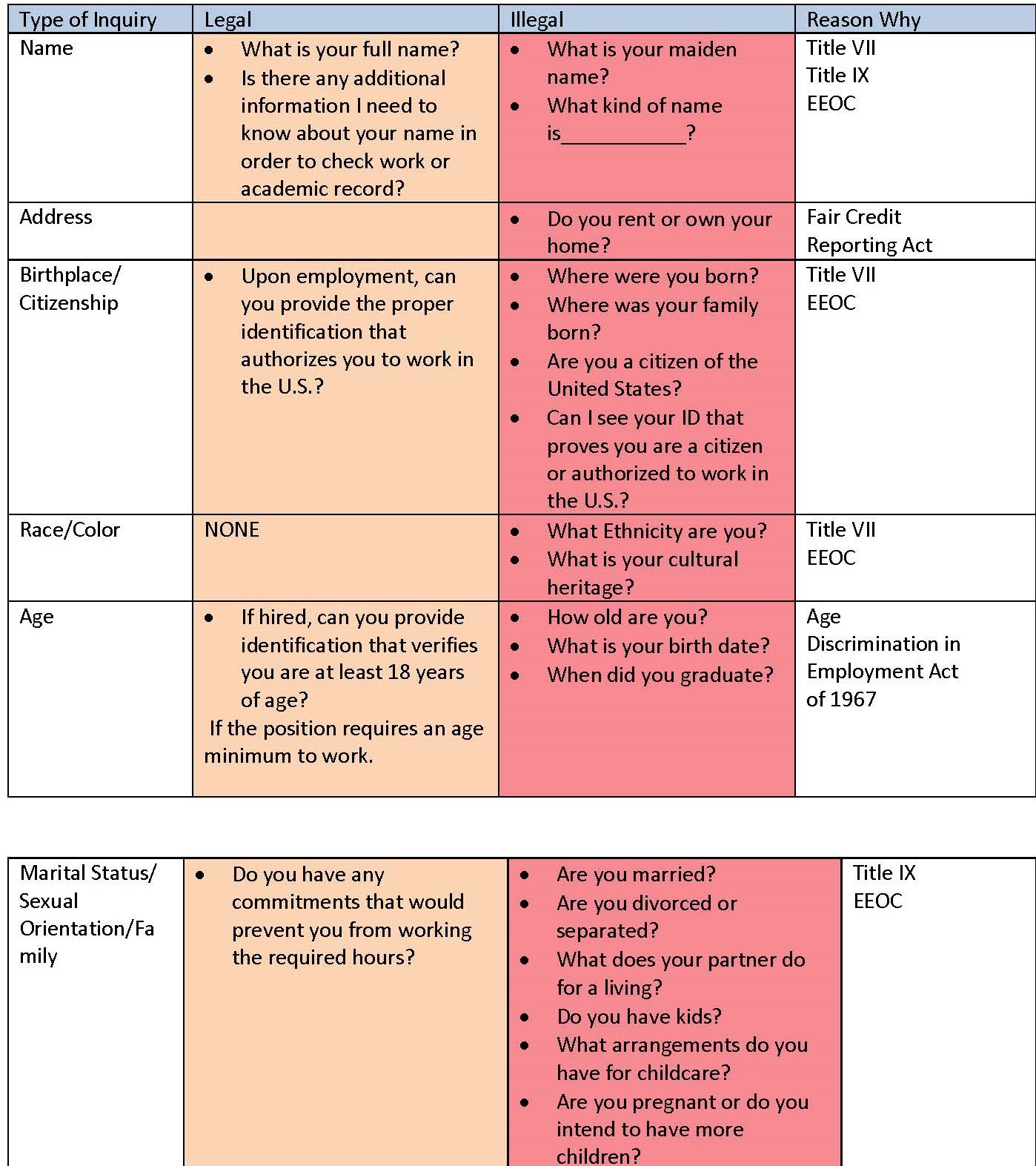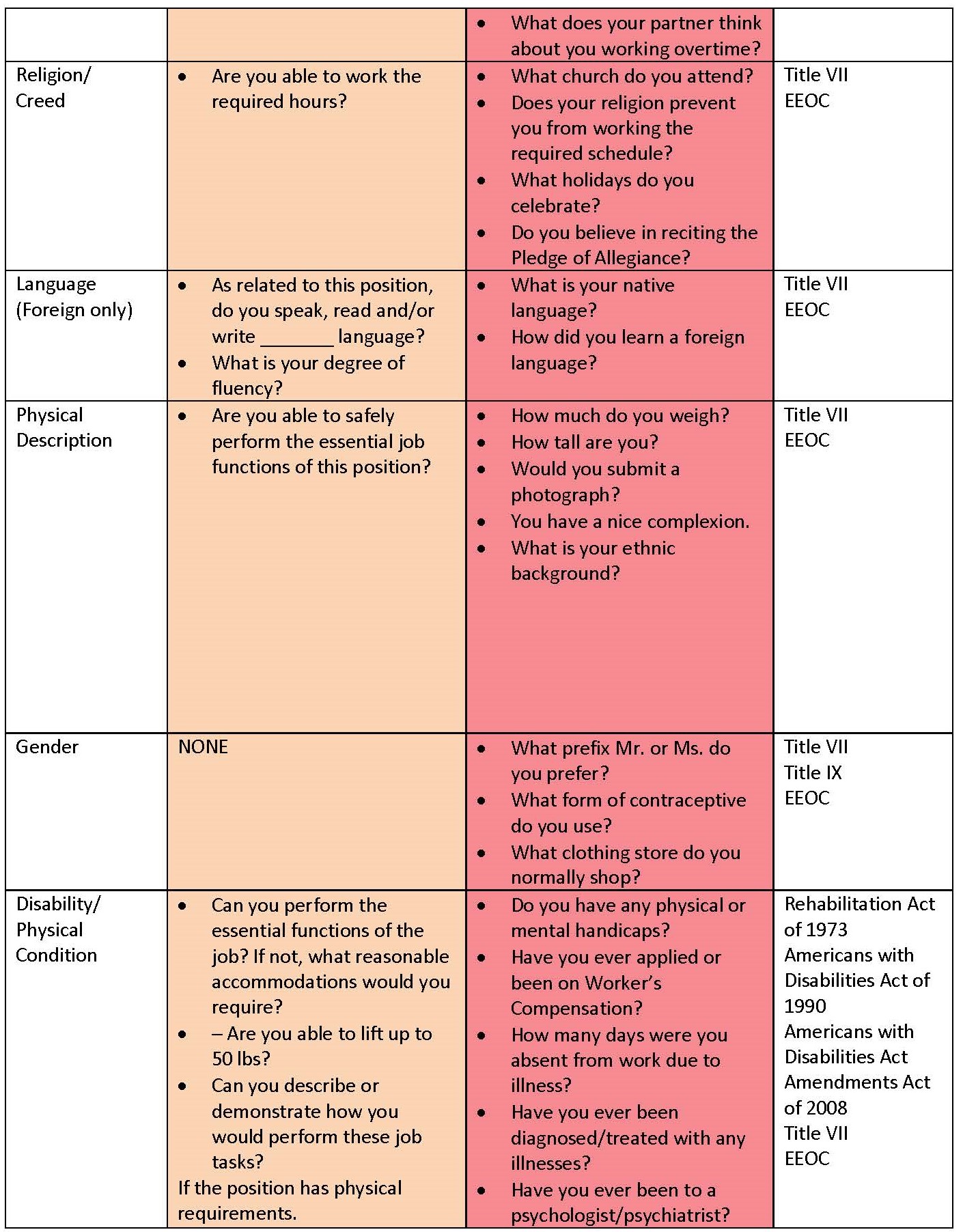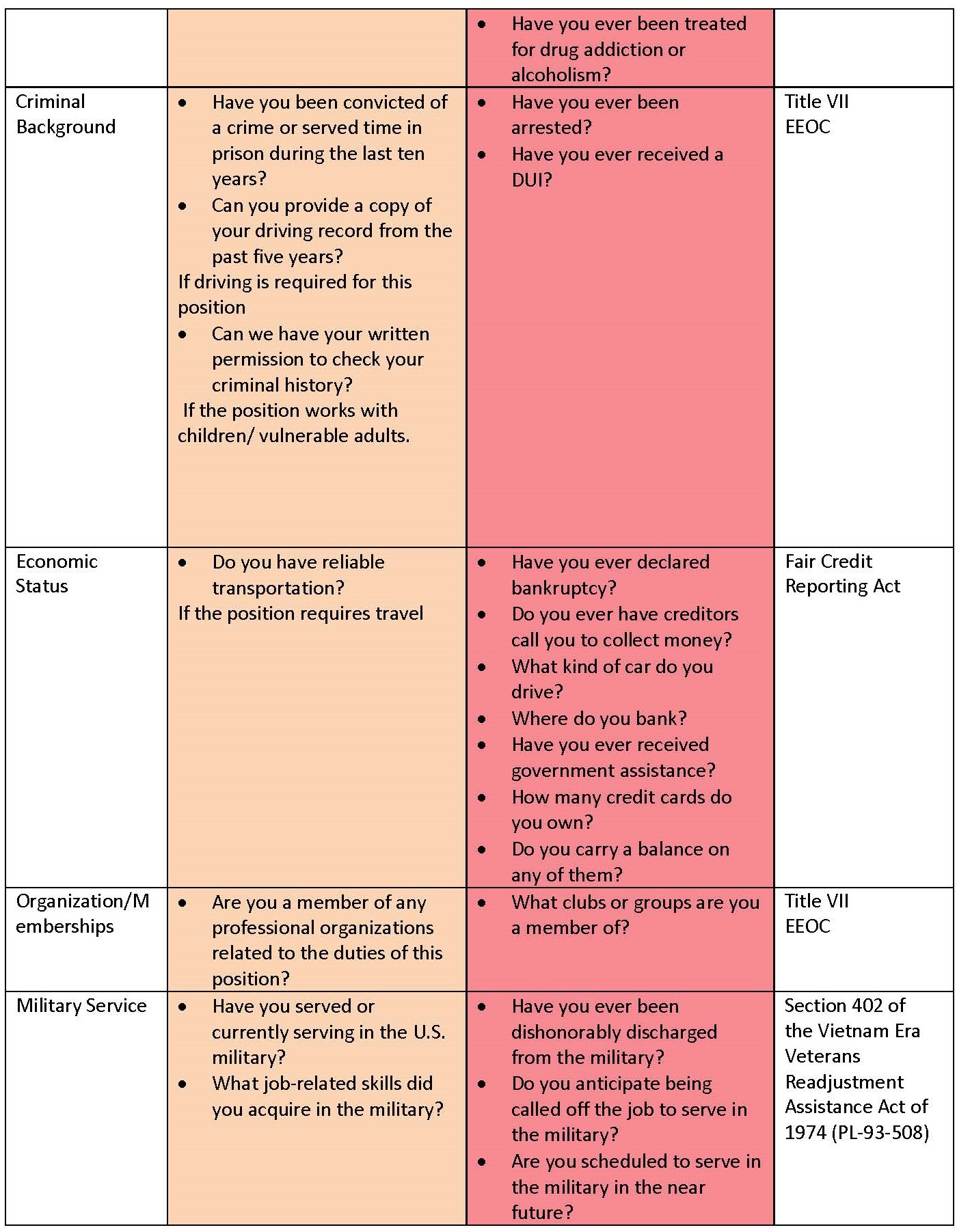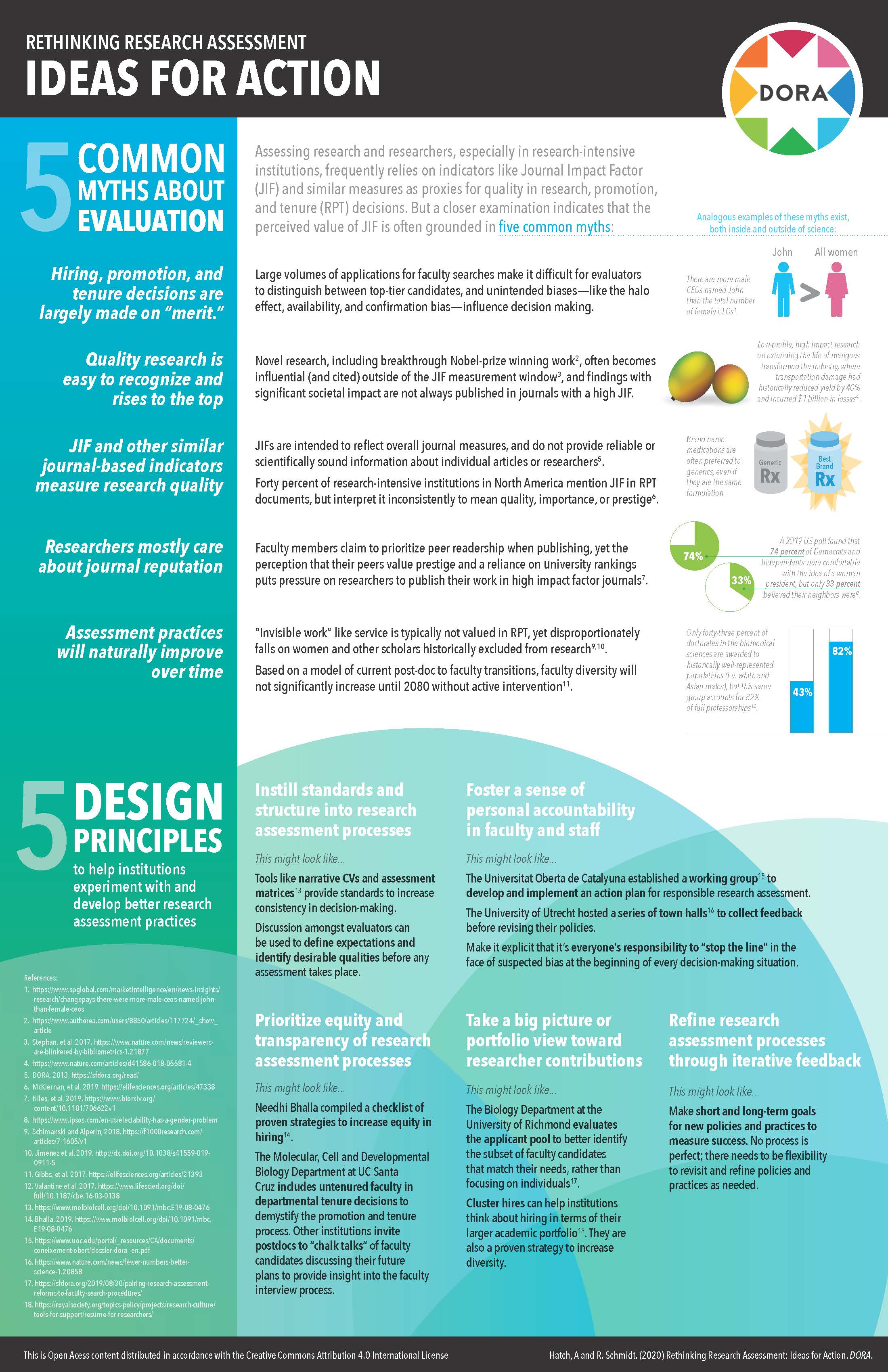Last Updated by IDE 3/1/17: Adapted from Clark College EST. 1933 from Clark College Screening Committee Process Guide.
1. Legal and Illegal questions:
Keep the questions job related. The reasons for the questions are to determine if the applicant has the knowledge, skills, and abilities to do the job and can perform the work at the appointed time and place.




Laws that prohibit employment discrimination:
- Title VII of the Civil Rights Act addresses unlawful employment practices.
- EEOC is the Equal Employment Opportunity Commission. It is responsible for enforcing federal laws that make it illegal to discriminate against a job applicant or an employee because of the person's race, color, religion, sex (including pregnancy), national origin, age (40 or older), disability or genetic information. It is also illegal to discriminate against a person because the person complained about discrimination, filed a charge of discrimination, or participated in an employment discrimination investigation or lawsuit.
- Title IX prohibits sex discrimination in any education program or activity.
- Age Discrimination in Employment Act prohibits employment discrimination against anyone at least 40 years of age.
- Rehabilitation Act prohibits discrimination on the basis of disability.
- Americans with Disabilities Act prohibits discrimination and ensures equal opportunity for persons with disabilities in employment.
- Fair Credit Reporting Act restricts who has access to sensitive credit information and how that information can be used.
- Section 402 of the Vietnam Era Veterans Readjustment Assistance Act is one of two key federal laws prohibiting discrimination against returning veterans.
There are conversational contexts in which some of these questions may emerge appropriately and at the invitation of the candidate. However, questions along these lines, when initiated by an interviewer or pursued too extensively, can raise inference of improper motivation and can be used as evidence of discrimination.
2. Common Rater Errors:
Bias: Prejudice in favor of or against one thing, person, or group compared with another, usually in a way considered to be unfair. An inclination or preference that influences judgment from being balanced or even-handed.
Definition from field of Statistics:
A systemic inaccuracy in data due to the characteristics of the process employed in the creation, collection, manipulation, and presentation of data, or due to faulty sample design of the estimating technique.
- First Impressions & Snap Judgments: This is the tendency to form first impressions or make a quick or “snap” judgment of applicants and let that affect how you rate their responses.
- “Halo” and “Horn” effects: the tendency to rely on one good (halo) or one bad (horn) response to influence the evaluation of all other responses of that applicant.
- Contrast effect: This is the tendency to assess an applicant in comparison to the performance of a previous applicant. Be sure to evaluate applicants independently, based on the responses and qualifications being assessed.
- Stereotypes: Stereotyping is often based on demographics such as sex, race, ethnicity, or age, but can also involve other variables such as degree of education, number of jobs held, etc.
- Similar-to-me or Projection: This occurs when an applicant is given more favorable evaluations than warranted because of a similarity to the panelist in some way. The reverse can also occur where an applicant is given less favorable evaluations than warranted, because of perceived differences.
- Preoccupation: Tendency to not pay attention, particularly if it is a full schedule of interviews. Use good listening techniques and pay attention to the candidate; get up and stretch in between interviews.
3. Potential Questions Related to Cultural Competence:
(Adapted from Clark College EST. 1933 from Clark College Screening Committee Process Guide)
- What do you think are some of the greatest challenges within our organization (or the field) regarding addressing issues of cultural competency? How have you personally worked to overcome those challenges?
- Please describe how you would work to create a campus environment that is welcoming, inclusive and increasingly diverse.
- Describe how you, as a faculty member, function and communicate effectively and respectfully within the context of varying beliefs, behaviors, and backgrounds.
- What opportunities have you had working and collaborating in diverse, multicultural and inclusive settings?
- What is your definition of diversity? How do you encourage people to honor the uniqueness of each individual? How do you challenge stereotypes and promote sensitivity and inclusion?
- How do you seek opportunities to improve the learning environment to better meet the needs of students from all over the world and from students who have been historically marginalized in the USA, such as the Native Americans, African Americans, Latinos, Asians, and other communities?
- What is your method of communication with students/staff/faculty who are different from you? How do you convey thoughts, ideas, or adverse conclusions?
- Describe your experience or explain how you have been educated to understand the history of African Americans, Latinos, Asians, Native Americans and other historically marginalized communities in the USA.
- Describe your experience in serving or teaching underrepresented communities.
- Tell us about a time when you had to work with someone who had the direct opposite personality of yours.
- Give an example of how you walk in the shoes of people we serve and those with whom we work.
- How has your current/previous employer benefited from multiculturalism?
- Describe a situation in which you encountered a conflict with a person from a different cultural background than yours. How did you handle the situation? (Please be specific)
- In previous work experiences, what has been the greatest obstacle in developing a multicultural-competent staff?
- Describe a situation in which you utilized your multicultural skills to solve a problem.
- What ideas do you have for educating students about diversity?
- How has diversity played a role in shaping your social style?
- Tell us about a time when you changed your style to work more effectively with a person from a different background.
- Tell us about a time you took responsibility/accountability for an action that may have been offensive to the recipient and how you did that.
- Describe a time when you needed to work cooperatively with someone that did not share the same ideas as you.
- Give an example of a time when you had to make an adjustment to your personal style to successfully work with a coworker.
- How can you contribute to our goal of valuing diversity?
- Describe how you go about making people who present differently from you feel at ease and know they are being heard.
- Tell us about a time when you built relationships across differences.
- We all have biases – tell us about a time or situation where your bias may have gotten in the way or influenced your work or approach. What did you do to address or counter the bias?
4. Interviewing Candidates with a Disability:
(Adapted from Clark College EST. 1933 from Clark College Screening Committee Process Guide)
Dartmouth College is required to make reasonable accommodations for job applicants with disabilities. As a prospective employer, you cannot ask questions about a disability. You can ask questions about the applicant’s qualifications and ability to do the job safely. You are allowed to ask all applicants to explain or demonstrate how they can perform functions of the job.
Prohibited Questions
- Have you had a major illness in the last 5 years?
- How many days were you absent from work because of your illness?
- Have you ever been hospitalized? If so, for what?
- Have you ever had or been treated for the following conditions or diseases?
- Please list any conditions or diseases for which you have been treated in the past 3 years.
- Have you ever been treated by a psychiatrist or psychologist? If so, for what?
- Have you ever been treated for drug addiction or alcoholism?
- Are you taking any prescribed drugs?
- Do you have any disabilities or impairments that may affect your performance in the position for which you are applying?
Permitted Questions Asked of All Candidates (If you ask one interviewee, you must ask all)
- Can you describe or demonstrate how you would perform ______ job task?
- Are you able to safely perform the tasks of the job?
When interviewing applicants who use wheelchairs:
- Always offer to shake hands.
- Get on the same eye level as soon as possible.
- Don’t lean on the wheelchair.
- Always ask first before offering assistance.
When interviewing applicants who have a visual disability:
- Identify yourself and others present. When conversing in a group, identify the person to whom you are speaking.
- Use verbal cues (handshake, chair location).
- Do not touch a walking stick or guide dog.
- Don’t shout.
When interviewing applicants who have a hearing impairment:
- Look directly at the person and speak clearly, slowly and expressively to establish if the person reads lips. Keep your face free of obstructions such as pens or fingers.
- If you have difficulty understanding an applicant, don’t pretend that you understood. Instead ask the applicant to repeat or rephrase the sentence.
- Use a physical signal to get the applicant’s attention if necessary.
- Don’t shout.
- If they use a sign language interpreter or CART (transcriber) look directly at the individual person and not the interpreter.
Can an employer ask an applicant whether they will need a reasonable accommodation for the hiring process?
Yes, an employer may tell all applicants what the hiring process involves (for example, an interview, presentation, job demonstration), and then ask whether they will need a reasonable accommodation for this process. If they do, immediately refer them to the Office of Institutional Diversity and Equity at 603-646-3197, or email ADA.IDE@Dartmouth.edu.
Rubrics and Assessment Guidelines:
- Avoid Journal Impact Factors (JIF) as a proxy for individual accomplishment; JIFs may be misleading depending on field of study and individuals' contributions to the work.

- For conventional peer-reviewed publications, consider published papers or (potentially) those submitted, but be aware of bias introduced by candidates who list papers in preparation, especially if they list journals to which the hope to submit (but the papers have neither been submitted nor accepted). Be aware of field specific considerations: e.g., importance of job market papers for health economics or of reviewed abstracts for proceedings of engineering meetings;
- When candidates interview, request that presentations of their data note PMID to indicate work has been peer-reviewed and published, but not indicate the specific journal citation on slides;
- As much as possible, use the same rubric for assessment of all candidates (interview templates are available on the Office of Faculty Affairs site) and ensure uniformity to the greatest extent possible (i.e., if first interviews are by Zoom, all candidates should be interviewed that way, if possible);
- Avoid bias associated with institutional cohorts (e.g., Ivy Plus): recognize that well-qualified candidates may come from a broad spectrum of institutions;
- Ensure that any notes on candidates, whether on Interfolio or on other documents, refer to the specific criteria set out for the search and comport with EEO practices for fair hiring.
- Do not reach out to colleagues at candidates' current institutions to ask their opinions of the candidates unless the candidates have provided permission for the search committee to do so. This may breach their confidentiality with respect to the search and may also introduce variances across candidates (i.e., search committee members have colleagues they know well enough to reach out for some candidates, but not all).